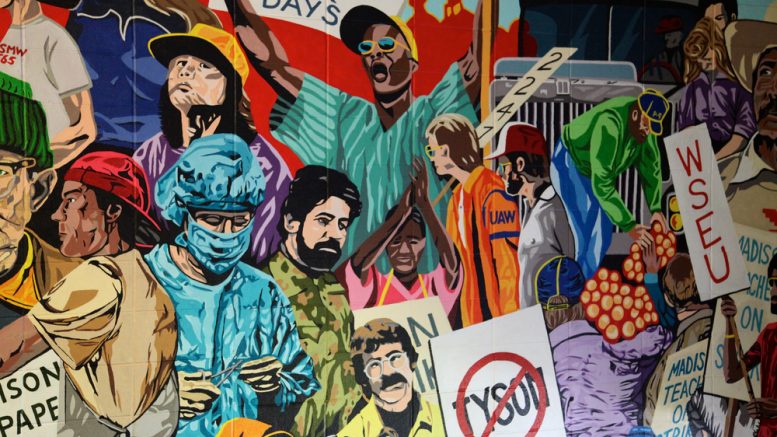
By Tom Crofton
The Commoner Call (5/22/17)
Wisconsin has joined the ranks of states whose legislatures are deciding that state statutes protecting the well being of blue collar people are terrible cases of the government picking winners and losers. Our elected officials are ignoring a “Business 101” principle that a well educated and fully employed working/middle class actually drives a more productive economy than one based on trickle-down-from-the-billionaires. The need for a vibrant consumer base has been lost behind rhetoric that papers over the hidden rip-offs of dodgy private sector benefits – like 401(k)’s, Health Savings Accounts, etc – while championing the move away from “entitlements” towards a brave new world of vouchers and vague promises of subsidies that will never keep pace with rising costs. The steady erosion of purchasing power through intentional inflation and planned recession has eaten up irregular, small cost-of-living gains and left workers worse off than they were in the 1980’s.
Large, refundable tax credits to big business are however deemed good ways to pick winners, because they supposedly “grow the economy”. But when one considers the total lack of responsible oversight for the corporate tax credits, undocumented loans, and absence of audits and oversight these costly corporate handouts are nothing more than old-fashioned cronyism. Meanwhile, the Wisconsin State Legislature and Governor have openly declared that peeling away the standard of living of the people who labor in this state is moral and designed to grant workers greater freedom … the freedom to be poorer.
A great deal of work and study is being done on how to frame an argument that favors an economy that raises all boats. Much of this is reactive to the decades long effort by corporate Republicans and Democrats to redefine our language into sound bites that suit their propaganda supporting a concentration of wealth ever upward. A case in point is “Right to Work” (RTW).
The corporate lie is that we can’t afford to pay decent, family-supporting wages to workers to rescue and rebuild our infrastructure or health care systems. Yet, somehow those making that argument don’t blink at $150 million dollar executive bonuses or refundable corporate tax credits.
No one has ever suggested that people do not have a right to work. Conservatives object to union shops where collective bargaining by workers has created a benchmark standard higher than they would like. The fact that businesses negotiated these standards fairly, over decades, is a critical fact that gets lost in the rhetoric. Conservatives have not yet been able to roll back all union activity as part of their broad strategy of reversing “The New Deal”, but they are working at it! They figured out ways to hobble private sector unions the way Wisconsin’s Act 10 wounded public sector ones. RTW statutes prevent a union from collecting dues from workers who do not want to pay their fair share for the representation and benefits they receive.
In practical terms, RTW should more honestly be called Right to Mooch.
Dividing the workers
At the same time corporations lap up public subsidies and cash in on sweetheart government contracts anti-union employers play up the myth of the strong individual worker, who is young and can get by without good health care, is years from retirement, and whose lack of specific certified training is accepted as a trade-off for low wages. Those corporate powers know that divided workers are exploited workers.
In a RTW state, the new breed of employee is encouraged to freeload on the solidarity and hard-earned benefits of those who went before. And when declining wages and shoddy benefits can’t support the family the worker is simply directed to sign up for public assistance, which is just another indirect form of corporate welfare. For example, the highly profitable Walmart corporation costs taxpayers $6.2 billion a year in public assistance for their employees.
Forbes magazine – no radical rag – reports that in Wisconsin the Walmart subsidy breaks down to each Walmart Supercenter “costs taxpayers between $904,542 and $1.75 million per year, or between $3,015 and $5,815 on average for each of 300 workers.” (You can read the full report How Taxpayers Subsidize America’s Biggest Employer and Richest Family here.)
Wisconsin is going to learn a great deal more about all this over the next few years.
The initial experiment with public workers shows a precipitous drop in union participation. Efforts over the last few decades to eliminate unions, including off shoring and moving jobs to chintzy RTW states have been effective. Only about 10% of the overall American workforce is protected by union membership. And only 6 % of the private sector is currently unionized (wage and salary workers).
Negotiated inequality
Most private sector union activity is found in heavy industry, construction, and transportation. Parallel, non-union alternatives exist in all of these remaining strongholds. As the attacks have intensified, a tilted two-tier system has been developed to treat new employees with employer-friendly wage and benefit scales. New airline pilots, for example, often need food stamps and public assistance to afford their jobs. Older auto workers had to agree to a low-tier, entry level set of rules for new employees to maintain their traditional compensation packages as they near retirement. These developments constitute a Brave New World for American workers.
The corporate lie is that we can’t afford to pay decent, family-supporting wages to workers to rescue and rebuild our infrastructure or health care systems. Yet, somehow those making that argument don’t blink at $150 million dollar executive bonuses or refundable corporate tax credits to manufacturers who get fat checks from taxpayers, while never producing the jobs they promised. The lowest level public health workers make less than federal poverty guidelines. Union carpenter foremen make 60% of the median income (30% from the bottom). RTW is proving to be a one-way fast track to poverty and insecurity.
We have enormous unused resources that smart working people can manage sustainably to build a peaceful prosperous society for all. We need to be truthful to the ideals of thrift and frugality when it comes to corrupt and inefficient systems that are kept in place with tidal waves of lobbyist dollars. We must replace them with best practices and let the sunshine of full disclosure and public debate on the merits of competing systems, public and private, help us find the best solutions. But with maneuvers like corporate-friendly RTW, middle class opportunity is a vanishing memory for more and more workers, which leaves all of us the poorer and less secure.
(Photo from the Labor Temple mural in Madison, Wisconsin.)

